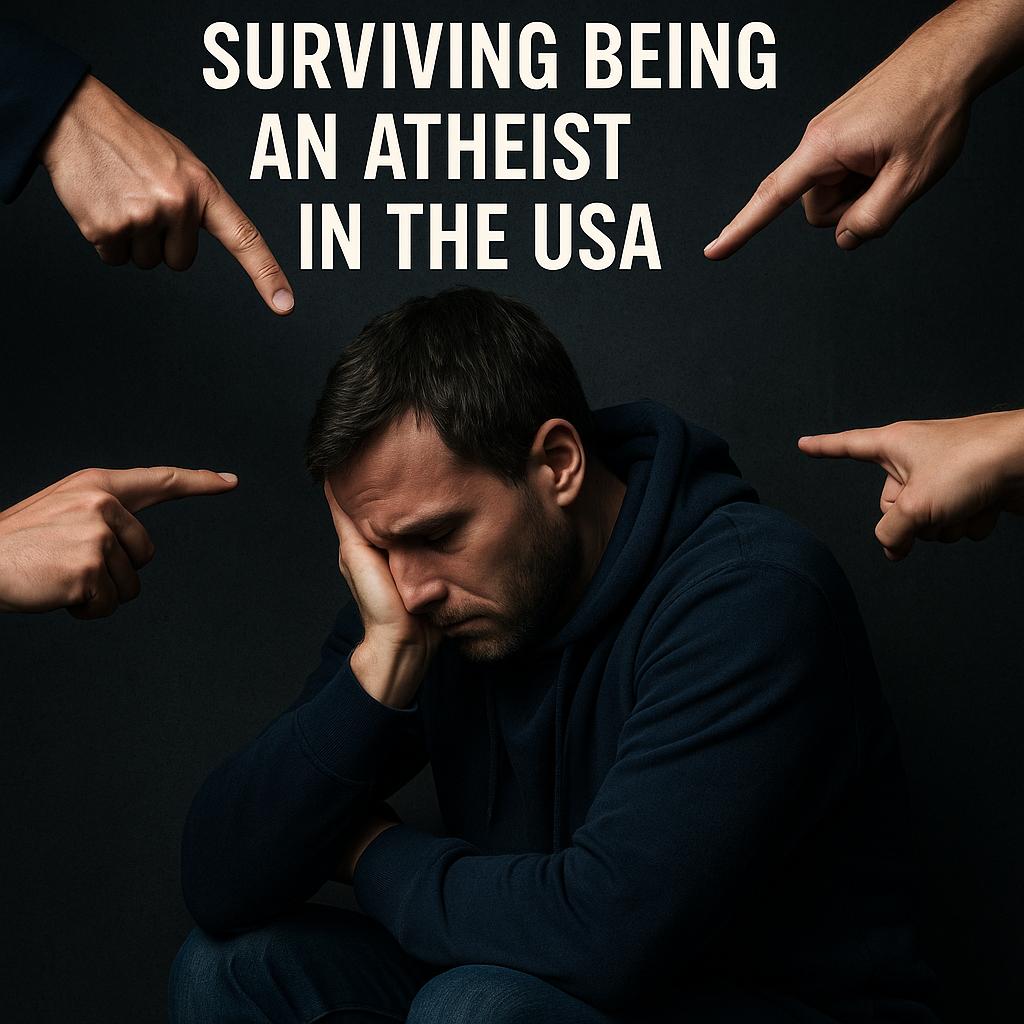The United States is a paradox. It was founded with secular principles. Yet belief in God still dominates. Churches line every street. Presidents end speeches with blessings. Children pledge allegiance under a deity.
Atheists do exist—millions of them. But in many corners of the country, they walk silently. Their disbelief is not just personal. It is political. Social. Dangerous. And despite rising numbers, the stigma has not gone away.
Social costs of disbelief
Being honest about atheism can cost you. Family dinners turn cold. Friends disappear. Dates reject you before coffee. In religious towns, it can ruin your reputation. You become the “one who hates God”—even if you never mentioned Him.
Many parents fear their children will be punished in school. Teachers talk about prayer. Coaches lead them in it. Speaking up invites whispers. Remaining quiet brings pressure. It is a no-win.
In the workplace, it gets trickier. Believers might not hire you. Co-workers freeze out those who question divine plans. Even in secular industries, religion hides in slogans, symbols, and culture.
The Bible Belt and beyond
If you live in the South or Midwest, silence often feels like survival. In the Bible Belt, atheism is betrayal. Families cut ties. Pastors preach about your soul. Local papers will not publish your letters.
A simple bumper sticker can get your car keyed. A single Facebook post can lose you a job. In small towns, privacy is a myth. Everyone knows—and judges.
But even in cities, it is not easy. Some neighborhoods accept you. Others do not. Geography helps, but it never guarantees freedom.
Atheists in politics and media
Despite the First Amendment, atheists remain invisible in power. Congress has only one openly nonreligious member. Presidents never admit doubt. Local officials keep their beliefs vague.
Polls show Americans trust atheists less than Muslims, immigrants, or even former criminals. The word still triggers fear.
In media, atheists appear as bitter loners, smug intellectuals, or villains without values. Few are shown as ethical, relatable, or emotionally whole.
US presidents and covert disbelief
Many presidents pretended to believe. Jefferson mocked religion privately. Lincoln rejected organized faith. Eisenhower got baptized only after being elected.
They knew the cost of honesty. Public image mattered. Doubt was hidden behind vague references to providence and “Almighty” abstractions.
The truth? Several likely had no belief. But they also had no freedom to say so.
Brutal facts: What atheists actually face
The stigma is not just cultural. It is measurable. Hard. Unfair.
Over 40% of Americans believe atheists should not teach in public schools.
Seven U.S. state constitutions still ban atheists from holding office, even if unenforceable.
Pew and Gallup polls show atheists are the most distrusted minority, more than Muslims, immigrants, or gay people.
Atheism can lose you child custody—judges cite “moral upbringing.”
In the military, atheists report exclusion, bullying, and threats.
In rural areas, disbelief leads to lost jobs, vandalized homes, and broken families.
This is not abstract. These are lives. This is silence under pressure.
A broken promise: From progress to collapse
Few people realize this, but the United States of the 1930s was already one of the most advanced countries on Earth. Despite the Great Depression, it led in science, medicine, and modern infrastructure. The ideals of progress were alive. The New Deal created hope. The nation built forward.
But then, everything changed.
By the 1960s, banks and corporations hijacked the system. Social welfare began to rot. Private insurance replaced public rights. Wall Street dominated policy. Corporate wealth exploded. Human security collapsed.
And today? The richest country in history has no national health care. Tens of thousands of Americans die every year because they cannot afford basic medical care. There is no universal disability pension. A broken spine or a mental illness leaves people with nothing. No care. No help.
Meanwhile, billionaires hoard power. The nation that once promised progress now shelters obscene inequality. Three men own more wealth than half the country. Homeless encampments spread. Rural hospitals vanish. Schools crumble. And still, politicians talk about freedom.
For atheists, this collapse feels colder. No church offers charity, no pastor shields your suffering. No faith community sees you as one of their own.
You are left to survive in a machine that was once humane—and now devours its own.
Being an atheist: Strategies for survival
So what do you do? You build your own networks. Online groups. Sunday Assemblies. Local meetups. You do not stay isolated.
In conversations, you choose your battles. Sometimes humor softens truth. Sometimes silence protects peace. But when the moment matters, you speak.
You learn to handle family disappointment. You accept that some bridges will burn. Others may rebuild.
Diplomacy does not mean dishonesty. It means timing. Strategy. Focus.
Legal protections and their limits
The Constitution protects you. But society might not. Teachers still lead prayers. Employers still preach morals. Courts still favor believers.
If you are harassed, the law might help. Or it might look away. Judges carry biases too. And juries vote with their hearts.
Legal protection exists—but it is not bulletproof.
Why speak up anyway?
Because silence protects no one in the long run; because the next generation needs examples. Because your honesty creates space.
When others see atheists as moral, kind, thoughtful people, the fear fades. Slowly. But surely.
Speaking up does not mean converting others. It means existing. Out loud. Proud. And sane.
Conclusion: Choosing courage
Being an atheist in the USA is not about rejecting something. It is about surviving something.
You face isolation, judgment, and exclusion. But you also find clarity. Community. And purpose.
Reason is quieter than faith. But it runs deeper. And once it takes root, no amount of stigma can uproot it.
Stay strong. Others are out there. And your silence is not required anymore.

Leave a Reply